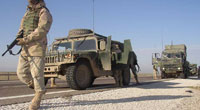Worst attacks in Iraq since withdrawal
Bombs killed nearly 60 people in Iraq on Thursday in the worst violence since U.S. combat troops withdrew from urban areas last week, and American forces released five Iranian officials suspected of aiding Shiite insurgents.

U.S. officials said they believe the Iranians , detained in northern Iraq in January 2007, had facilitated attacks on American-led forces but handed them over to the Iraqi government at its request because they were obliged to do so under a U.S.-Iraqi security agreement.
The U.S. State Department said it was concerned their release could present a security threat to American troops in Iraq .
Iraq's foreign minister, Hoshyar Zebari , called the release a "good initiative" that could encourage dialogue between Washington and Tehran, which are longtime foes, according to AP.
New York Times reports that Iraqi military and police forces now have more control over security than ever before, and yet they face a tenacious insurgency in places like Nineveh and Baghdad with far less overt American combat support.
“We need more security forces to protect us,” a shopkeeper who would identify himself only as Ali said in the aftermath of an attack in the Sadr City section of Baghdad. “We need someone to take care of us.”
The persistent violence in Mosul and Nineveh underscores the broader turmoil afflicting Iraq. But it also reflects the region’s unique mixture of insurgency and ethnic tensions between Kurds and Arabs, as well as a proliferation of criminal gangs, that makes the north the most dangerous part of the country.
Subscribe to Pravda.Ru Telegram channel, Facebook, RSS!





